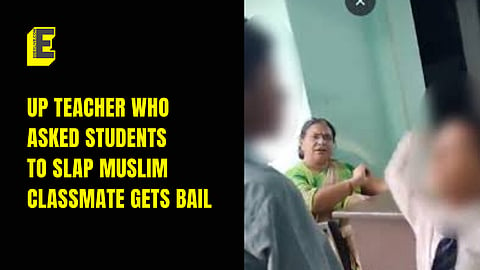

A court in Muzaffarnagar, Uttar Pradesh, granted bail on December 5 to Tripta Tyagi, the teacher accused of encouraging students to beat a Muslim child as punishment at her school.
Special Judge Alka Bharti, while granting bail, considered several factors, including the fact that a chargesheet had already been filed in the case and that Tyagi had not been arrested during the investigation. The judge also noted that Tyagi, 61, suffers from 40 per cent disability, and the alleged offences carry a minimum sentence of seven years in prison, according to a report by Bar and Bench.
This decision comes after the Allahabad High Court had, just a month earlier, denied anticipatory bail to Tyagi and directed her to surrender before the concerned court within two weeks. However, the high court also granted her a two-week window before any coercive action could be taken.
What happened?
In a video that went viral last year, Tyagi was seen asking students to slap a Muslim child while making derogatory remarks about his religion. The incident, which went viral on social media, sparked widespread outrage.
Following the viral video, the school was sealed, and Tyagi was charged with voluntarily causing hurt and other offences under the Indian Penal Code (IPC), along with Section 75 of the Juvenile Justice Act.
In her defence, Tyagi later released a video in which she denied any communal intent behind her actions but admitted to making a mistake.
Her legal counsel argued that the First Information Report (FIR) against her was filed with the intention of portraying the incident as communal in nature. The defence further contended that Tyagi’s actions did not incite inter-community violence or harm social harmony.
Meanwhile, a petition filed by Tushar Gandhi, the great-grandson of Mahatma Gandhi, has been taken up by the Supreme Court. The petition calls for an independent, time-bound investigation into the incident and urges measures to prevent violence against students from religious minorities. The Supreme Court has been issuing periodic directions on the case, stated the Bar and Bench report.
